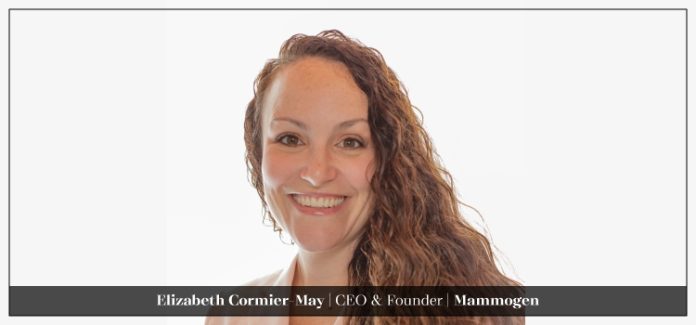Mammogen is a woman-led biotechnology company that aims to radically improve the early detection, diagnosis and treatment of women’s health-related diseases. The company uses data, tech, science, and personal experience to shatter complacency and aims to create an end-to-never-end community for women around the world.
Established in 2020, Mammogen is the brainchild of Elizabeth Cormier-May. While leading as the CEO, Elizabeth also serves as the SVP and CCO of IV BioHoldings (IVBH) with her partner and its founder, Martin Keiser. Mammogen is one of three firms within the IV BioHoldings ecosystem. IVBH envisions, builds, and develops first-in-class bio-platform companies that revolutionize illness detection, diagnosis, and treatment. From R&D to company creation to productization to commercialization, IVBH’s novel and distributed-company platform are defined by speed, efficiency, and risk management, made possible by advanced data science, exponential technologies, powerful partnerships, and over 60 years of combined multi-disciplinary expertise.
Aiming for Early Detection, Diagnosis and Treatment
Mammogen is determined to fulfill its mission to radically improve diagnostics of women’s health-related issues. It seeks to communicate about the fear, anxiety, depression, marital challenges, body-shame issues and other associated concerns that are induced due to health complications.
The company is starting with its genTRUTM suite of breast diagnosis. The two early detection tests within this flagship program are based on 26 mRNA biomarkers. The company’s innovative multi-gene expression signatures translate to non-invasive and painless diagnostics poised to bring regular, accurate screening to women who are underserved by current guidelines.
The genTRUTM suite of products has been validated on both blood and saliva and offers best-in-class performance. Mammogen’s current focus is to continue the clinical development of genTRUTM and speed towards commercialization to make early breast cancer detection a reality for women who would be immediately appropriate for these tests. Its novel multi-gene expression signature for the non-invasive detection and diagnosis of breast cancer has been positioned to unlock regular and reliable screening and diagnostic tools for tens of millions of women—women who are grossly and unnecessarily underserved by the present standard of care.
Innovative Suite of Non-Invasive Diagnostics
Mammogen offers two non-invasive diagnostics for breast cancer.
- The genTRUTM-EDT test (early detection test): A non-invasive simple blood test designed to diagnose women who are ineligible for imaging. It is mostly designed for women under the age of 40 or above 55 who are not candidates for yearly mammography.
- The genTRUTM-PID test (post-imaging diagnostic): A test designed to rule the correct women out of invasive breast biopsies when such procedures would be unnecessary.
The technology has the potential to reduce false negatives and increase early screening among women. It also reduces false positives and allows for the safe monitoring of suspicious nodules. Ultimately, the goal is to offer every woman, regardless of age, background, financial situation, or genetics, a chance at an early and safe diagnosis, potentially saving millions of lives.
In addition, the genTRUTM suite of products have been validated on both blood and saliva and offer best-in-class performance. Mammogen’s innovative multi-gene expression signature is non-invasive and painless. The company is poised to bring regular, accurate screening to women who are underserved by current guidelines.
Novel Approach to Data and Technology
The IVBH companies approach data and technology in entirely novel ways. This approach enables Mammogen to perceive things that others are unable to comprehend or see. Its complete approach rearranges the pieces of R&D, productization and commercialization in a way that enables the company to reduce time and risk, as well as induce efficiencies that others are unable to capture.
Mammogen is currently on its mission to pursue something of utmost importance. The company is working to develop, validate and commercialize its breakthrough liquid biopsy for breast cancer detection and confirmatory diagnosis. It is also exploring other research and development projects, both within breast cancer, and other diseases that affect women. Additionally, IVBH and Mammogen aim to continue innovating in every aspect—from fund-raising to product development—in ways that will allow them to introduce unparalleled efficiencies into delivering best-in-class products and create a new model of patient care.
Evaluating Success Parameters
Being at the helm, Elizabeth is responsible for a plethora of vital tasks that are essential for Mammogen’s development and success. The most important part of success, as Elizabeth believes, is learning from past failures and translating them into something far more powerful. For her, the biggest failure was assuming and actually believing that she needed to handle everything on her own.
Elizabeth has surrounded herself with intelligent and motivated people. She believes that acknowledging them is one of the most important factors of success. She adds, “Trying to handle everything is neither sustainable nor scalable.” In addition to the above skills, accepting, incorporating and celebrating the talents of others are also central to success.
About the Leader:
Elizabeth Cormier-May grew up believing she wanted to be a physician—specifically a pediatric oncologist. She wanted to think of better ways to contribute to battling cancer rather than fighting it at the front lines. As her education progressed, she realized it was the underlying science that intrigued her the most, specifically organic chemistry and system biology.
After her graduation, Elizabeth became a medicinal chemist in early discovery oncology for Novartis Institute for Biomedical Research. Despite having a profound affinity for science, she felt distant from the patients and wanted to focus on bridging this gap. Hence, she shifted to the commercial side of the industry where she has spent two decades building new products, markets and companies within the healthcare sector—all with the goal of meaningfully changing the patient journey.
Quote: “We want to stop focusing on remission as a benchmark for success. Why? Because we know that the battle never ends.”




